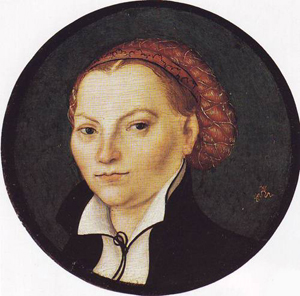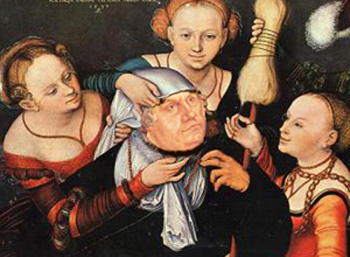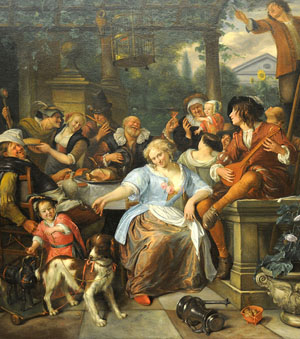 |
Faith under Attack
Luther's Licentiousness
Fr. Leonel Franca, S.J.
In my previous articles (here, here and here) analyzing
Luther’s life, I have only mentioned the vices that stain the higher part of the human soul. But, by an immutable law of Divine Providence, pride of spirit is chastised by rebellion of the flesh. The person who pretends to be divine falls to a state lower than the brute animal.

Catherine Bora, first his mistress, then his wife |
Luther offers to history a sad example of this divine punishment. In 1521, some remnant of his Catholic formation inspired these words he addressed to Spalatino, another member of his Augustinian Order: “Good God! Do the people of Wittenberg want to see even friars marry? But they will not succeed in imposing a woman on me. … Take care and do not marry so you will not fall prey to the tribulations of the flesh.” (1)
Immoral life
As the years passed, however, his new doctrines shattered that good intention. In 1525 the news broke that Luther, age 41, had married Catherine Bora, an apostate nun from the Cistercian Order. What happened? The reformer suddenly decided to marry to stop the evil gossip. (2) There was good reason, however, for that gossip.
In 1525, in a letter to John Rühel, councilman of Mansfeld, the heresiarch affirmed: “Despite the Devil, if I can, I will marry my Catherine before I die.” (3) That marriage made a bad impression on his contemporaries and followers. Luther perceived this, affirming: “Because of my marriage I became so despicable that the Angels had to laugh and the Devils to cry. Only in me does the world deride this work of God as impious and diabolical. (4)
Actually, the scandalous life of Luther started long before his marriage, as we can deduce from this letter in 1522 to his friend Spalatino: “Further, what you write me about why I should marry neither surprises nor convinces me, since I am [as you say] already a famous lover. …

"I have three wives at the same time..." |
"Since you ask me for an example, here you have this powerful one: Although I have three wives at the same time, I have loved them so strongly that I would give up two so that they might be taken by other husbands. … You see how the one you called a lover would make a terrible husband.” (5)
In a letter to Camerarius, Melanchthon confided: “Luther was an extremely frivolous man. The nuns whom he released from the convents would cleverly set traps to seduce him. His frequent dealings with them would make even a stronger and more noble-minded man effeminate and rouse the passions.” (6)
It is not difficult to imagine the sordid life of this ex-friar who surrounded himself with this kind of women who could break down men of much stronger moral constitution than his. We find examples of this in some of Luther’s letters written after his excommunication in 1521.
He left Worms and went to Warburg where the Elector Prince offered him asylum. Far from repenting, the unfortunate friar surrendered himself to idleness and sin. On July 13, 1521, he wrote to Melanchthon: “Here am I, reckless and hardened in inactivity, oh sorrow! I stopped praying and caring for the Church of God, because my flesh burns indomitably with an overpowering fire. In short, my spirit should burn, but instead my flesh burns with libido, laziness, inactivity and indolence.” (7)
Drunkenness and gluttony
Rarely a licentious life is not accompanied by excesses of the table. In Luther the fever of carnal concupiscence was stimulated by drunkenness and intemperance at the table. He would enter and win any drinking competition. He wrote to Catherine in 1540: “I am eating like a Bohemian and drinking like a German, God be praised!” (8)

More drinking and sin - Luther's solution to stomp on the Devil |
On July 25, 1534, he wrote to her: “Yesterday I drank too much, and then was obliged to sing. I drank too much and I regret it. I realize I should have imbibed less when I think in the good wine and beer I have at home, as well as a beautiful woman… You would do well to send me as often as possible some of my wine and your beer.” (9)
From Warburg he wrote on May 14, 1544: “Here I spend my whole day in sloth and drunkenness.” (10) When he arrived at Erfurt (October 19, 1522), the reformer did nothing but “drink and shout, as customary,” wrote Melanchthon, who was present there as witness. (11) These excesses harmed his health. On January 15, 1531 he wrote to Link: “The headache I got in Coburg caused by an old wine has not been cured yet by the beer of Wittenberg.” (12)
A friend, Jerome Weller, asked his advice on how to deal with temptations of the Devil. On November 6, 1530, Luther answered him: “When the Devil torments you with these thoughts, seek the company of friends at once, or drink more liberally, jest and play some prank or find something to amuse you. At times we need to drink more liberally, amuse and divert ourselves – or even commit some sins as an expression of hatred and contempt of the Devil, so as to leave him no room for raising scruples in our conscience about trifling matters. …
“Accordingly, if the Devil says to you, ‘Do not drink!’ you must reply, ‘Just because you forbid it, I will drink more in the name of Jesus Christ.’ In this manner you must always do the contrary of what the Devil forbids. Why do you think that I drink my wine unmixed, prattle on with unconcern, and eat more abundantly except to scorn and spite the Devil, who wants to scorn and spite me? … We must wipe the whole Decalogue from our eyes and hearts, we who are so assailed and tormented by the Devil.” (13)
He carried out these counsels so well that the meetings of the new reformer to decide about the highest questions of doctrine and morals would take place amid liberal drinking and eating.
The morning after Luther died he was found on the floor with his stomach swollen from “excessive food and drink. The previous night the reformer had risen from a table piled high with foreign wines and exotic food.” (14)
Thus, the apostate who pretended to be a reformer of Christianity ended his life as a glutton and vulgar libertine. And following the hierarchy of the rebellious angels, so also Luther – despite what his friends pretend – occupies the lowest place, closest to the mire and filth. (15)
Continued
1. Martin Luther, Briefe, Sendschreiben und Bedenken vollstaendig gesammelt, W.M.L. de Wette, Berlin, 1825-1828, vol. II, pp. 40, 41.
2. “Because of his bad fame Dr. Martin suddenly married,” wrote Blochingen to Palatino (Menkenh, Scriptores rerum Germanicarum, vol. 2, p. 645).
3. De Wette, vol. II, p. 655
4. De Wette, vol. III, pp. 2, 3.
5. De Wette, vol. II, p. 646.
6. Melanchthon, Brief an Camerarius über Luthers Heirat vom 16 Junii 1525, P.A. von Kirch, Mainz: 1900, pp. 8, 11.
7. De Wette, vol. I, p. 232.
8. Burkardt, Dr. M. Luther, Briefwechsel, Leipiz, 1866, p. 357, apud H. Brück, Lehrbuch der Kirchengesshichte, Mainz, 1888, p. 614.
9. Erlangern, Martin Luther, Saemtliche Werke, vol. IV, p. 553.
10. De Wette, vol. II, p. 6.
11.Corpus reformatorum, vol. I, p. 579.
12. De Wette, vol. IV, p. 213.
13. De Wette, vol. IV, p. 188.
14. Paulus, Luthers Lebensende und der Eislebener Aphoteker Ioham Landau, Mainz: 1896, p. 5.
15. Th. Mainage, Témoignage des Apostats, Paris: Beauchesne, 1916, p. 76.

Summarized and translated by the TIA desk from Leonel Franca,
A Igreja, a Reforma e a Civilização,
Rio: Livraria Catholica, 1928, pp. 196-200.
Posted April 11, 2011

Related Topics of Interest
 Luther’s Lack of Credibility Luther’s Lack of Credibility
 Luther’s Boundless Pride & Tyranny Luther’s Boundless Pride & Tyranny
 Luther’s Appalling Instabilities & Contradictions Luther’s Appalling Instabilities & Contradictions
 Luther Thought He Was Divine! Luther Thought He Was Divine!
 Luther: No, Absolutely No! Luther: No, Absolutely No!
 Card. Willebrands: Luther Is Our 'Common Master' Card. Willebrands: Luther Is Our 'Common Master'
 The October Revolution The October Revolution
 Benedict XVI at the Lutheran Temple Benedict XVI at the Lutheran Temple

| Related Works of Interest
|
Faith under Attack | Religious | Home | Books | CDs | Search | Contact Us | Donate

© 2002-
Tradition in Action, Inc. All Rights Reserved
|
 |
|